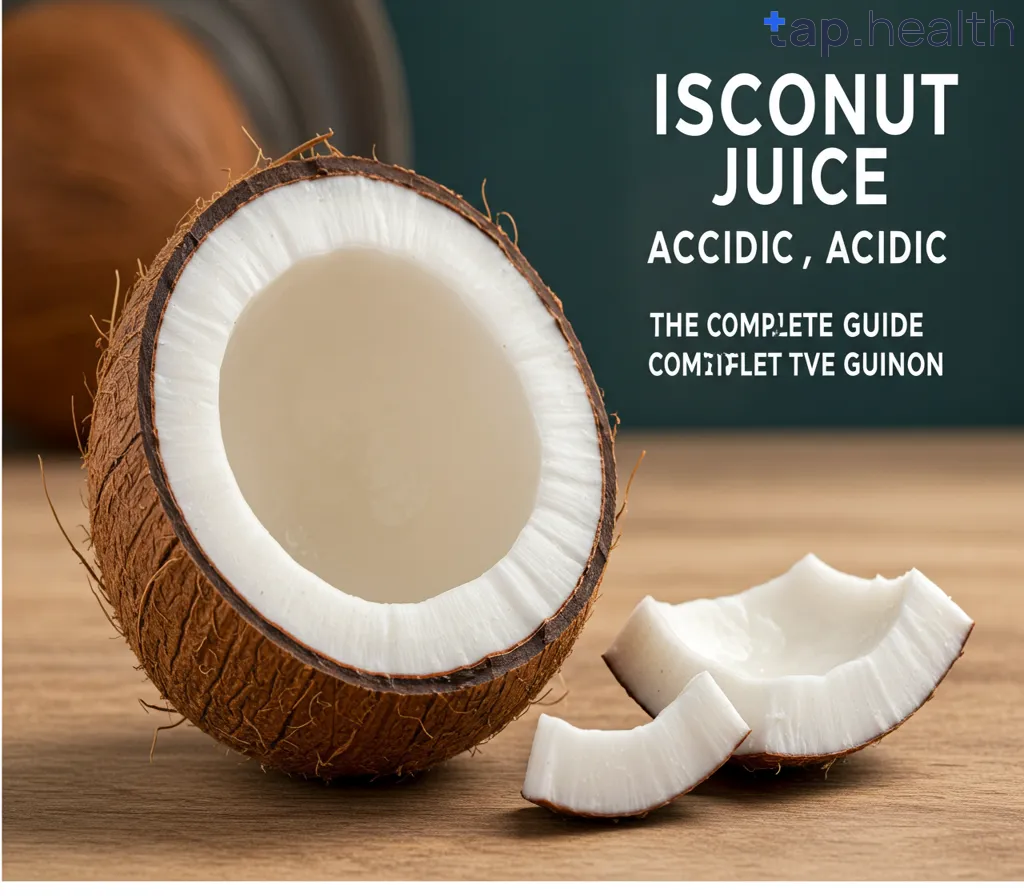Coconut juice, often referred to as coconut water, is a popular beverage, especially in tropical regions. Known for its refreshing taste and hydrating properties, many people consume it as part of a healthy diet. However, a common question that arises is whether coconut juice is acidic. In this detailed guide, we will explore the pH level of coconut juice, its effects on the body, and answer some of the most frequently asked questions about it.
What Is Coconut Juice?
Coconut juice is the clear liquid found inside young, green coconuts. It is not to be confused with coconut milk, which is a thicker liquid made by pressing the meat of mature coconuts. Coconut juice is a natural, low-calorie drink packed with electrolytes like potassium, magnesium, and sodium, making it a great hydrating option.
Why Is Coconut Juice So Popular?
The popularity of coconut juice has grown in recent years due to its numerous health benefits, including:
- Hydration: Coconut juice is a great alternative to sugary sports drinks because it naturally replenishes electrolytes and helps keep you hydrated.
- Low in Calories: It’s low in calories and free from artificial sweeteners, making it an excellent choice for those looking to maintain or lose weight.
- Rich in Nutrients: Coconut juice contains vitamins and minerals that are essential for overall health, such as vitamin C and calcium.
Is Coconut Juice Acidic or Alkaline?
To answer the main question: Is coconut juice acidic? – No, coconut juice is generally considered alkaline, although it is not as strongly alkaline as some other beverages like water or certain vegetables. The pH level of coconut juice typically ranges between 4.5 to 5.5, which makes it mildly acidic but leaning toward neutral.
Understanding the pH of Coconut Juice
The pH scale measures how acidic or alkaline a substance is. It ranges from 0 to 14:
- pH of 0-6: Acidic
- pH of 7: Neutral
- pH of 8-14: Alkaline
Since coconut juice falls on the acidic side of the scale, it is mildly acidic. However, it is still far from being as acidic as beverages like lemon juice or coffee, which have a pH closer to 2 or 3.
Why Does the pH of Coconut Juice Matter?
The pH level of coconut juice plays a significant role in its effects on your body. Even though it’s mildly acidic, it is still generally considered an alkaline-forming food once it is metabolized. This is because the minerals in coconut juice, such as potassium and magnesium, help balance the body’s pH and support a healthy acidic-alkaline balance.
Alkaline vs. Acidic Foods
An alkaline diet is believed to offer various health benefits, including:
- Reduced Inflammation: An alkaline diet may help reduce inflammation in the body, which is linked to numerous chronic conditions.
- Better Digestion: A balanced pH helps to optimize digestion and prevent acid reflux or heartburn.
- Improved Bone Health: Some studies suggest that consuming alkaline foods can help maintain bone density and prevent osteoporosis.
Since coconut juice helps promote an alkaline environment in the body, it is often included in diets aimed at improving overall health and wellness.
Health Benefits of Coconut Juice
Now that we understand the pH of coconut juice, let’s take a closer look at some of its health benefits, especially when consumed regularly.
1. Excellent Hydration
Coconut juice is packed with electrolytes, such as potassium, sodium, and magnesium, which help regulate your body’s fluid balance. These minerals make coconut juice a fantastic hydrating beverage, especially after exercise or during hot weather.
2. Supports Digestive Health
Despite being mildly acidic, coconut juice can actually aid digestion. It contains bioactive enzymes that promote better digestion and help prevent constipation. The presence of fiber also plays a role in maintaining a healthy digestive system.
3. Boosts Heart Health
Coconut juice is a good source of potassium, which is crucial for heart health. Potassium helps regulate blood pressure by balancing the effects of sodium in the body, reducing the risk of high blood pressure and stroke.
4. Natural Detoxifier
Drinking coconut juice may help detoxify your body naturally. Its high mineral content supports kidney function and promotes the elimination of toxins from the body.
5. Supports Skin Health
Coconut juice is often used in skincare products due to its high vitamin C content, which helps promote collagen production and keeps your skin youthful and vibrant. Drinking coconut juice can contribute to a healthy complexion from the inside out.
6. Rich in Antioxidants
Coconut juice contains antioxidants that help protect your cells from oxidative stress and damage caused by free radicals. These antioxidants may lower the risk of chronic diseases like cancer, diabetes, and cardiovascular diseases.
Is Coconut Juice Good for Acid Reflux?
For people with acid reflux or gastroesophageal reflux disease (GERD), the question arises: Can coconut juice aggravate acid reflux? Coconut juice has a mild acidity but does not typically cause heartburn. In fact, it is often recommended as a soothing, alkaline beverage that helps reduce the burning sensation associated with acid reflux. However, it’s important to note that individual responses may vary, and it’s best to consult with a healthcare provider before making it a regular part of your diet if you suffer from acid reflux.
Can Coconut Juice Be Consumed by People with Low Stomach Acid?
For individuals with low stomach acid (hypochlorhydria), drinking coconut juice may be beneficial. The mildly acidic nature of coconut juice can stimulate the production of gastric juices, which are essential for proper digestion. However, those with severely compromised stomach acid levels should consult their doctor before consuming coconut juice or any other acidic beverage.
Frequently Asked Questions (FAQs) on Is Coconut Juice Acidic?
1. Is coconut juice good for weight loss?
Yes, coconut juice is low in calories and contains beneficial electrolytes, making it a great drink for those looking to maintain or lose weight. It can be a healthy alternative to sugary drinks that contribute to weight gain.
2. Does coconut juice cause acidity?
Although coconut juice is mildly acidic, it is not typically associated with causing acidity or heartburn. On the contrary, it can help neutralize stomach acid and relieve symptoms of acid reflux in some individuals.
3. Can coconut juice help with hydration?
Yes, coconut juice is a natural electrolyte-rich beverage that helps hydrate the body effectively, making it a great alternative to sugary sports drinks.
4. What is the best time to drink coconut juice?
Coconut juice can be consumed at any time of the day, but it is especially refreshing after exercise or during hot weather due to its hydrating properties. Drinking it in the morning can also kickstart your hydration for the day.
5. Can coconut juice be consumed daily?
Yes, coconut juice can be safely consumed daily in moderation. It is a natural, low-calorie beverage that provides a range of health benefits when incorporated into a balanced diet.
6. Does coconut juice help in digestion?
Yes, coconut juice contains enzymes that aid digestion, promote gut health, and prevent constipation. Its high potassium content also supports healthy bowel function.
7. Can coconut juice improve skin health?
Yes, the antioxidants and vitamins in coconut juice can promote skin health by reducing inflammation and supporting collagen production. Drinking coconut juice regularly can contribute to clearer, healthier skin.
Conclusion
In conclusion, while coconut juice is mildly acidic, its pH level is not strong enough to cause significant issues for most people. On the contrary, it is a hydrating, nutrient-rich beverage that offers a variety of health benefits, from supporting digestion to improving heart health and skin quality. Whether you’re looking to stay hydrated, maintain a balanced diet, or support your body’s natural detox processes, coconut juice is an excellent choice. Always remember to listen to your body and consult a healthcare professional if you have any concerns about adding coconut juice to your diet.



